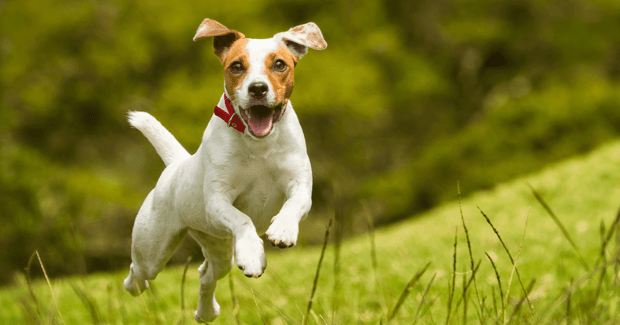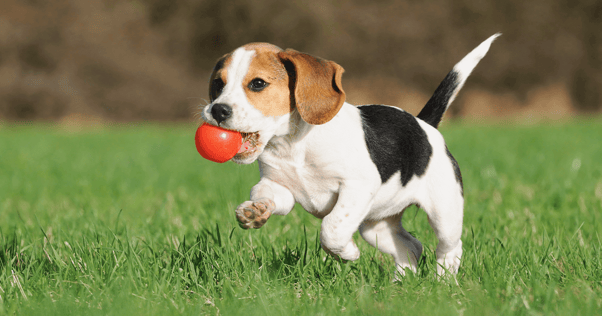The chances are that at some point you have seen a zoomy puppy, or perhaps even your own dog has had a case of the zoomies. But do you know what causes these sudden bursts of energy?
Our experts are on hand to explain this doggy behaviour and suggest some tips to help your pet remain calm and reduce stress.
What Are The Zoomies?
The technical name for the zoomies is Frenetic Random Activity Periods (FRAPs). As the name suggests then, the zoomies are sudden bursts of energy where your dog may do laps of the lounge or run in and out of rooms.
When a dog has zoomies, this is usually short-lived and will finish as soon as it starts. It’s also more common in younger dogs, but that doesn’t mean older dogs can’t do zoomies too!
So, are the zoomies anything to worry about? Running around isn’t harmful in itself, but it’s a good idea to recognize the different reasons behind why puppies get the zoomies.
Why Do Dogs Get The Zoomies?
As you can imagine, there are all manner of reasons why a dog might want to run around! That said, the zoomies are more than a dog simply having fun in the park. Usually, there will be an underlying cause behind a zoomy puppy or dog.
Potential causes for when a dog has zoomies can include:
- Overtiredness – though this may sound contradictory, some puppies can become more active and excited when they’re exhausted. The same can happen after they’ve spent time in a crate, too.
- Excitement – dogs can often know when it’s mealtime and work themselves into a high-energy state, or else they may simply be excited that their owner is returning home!
- Nervous energy – if your dog is in a stressful situation or they’re unsure of what’s going on, dogs can also show signs of tension while having the zoomies. Indications of this could include having their ears back or their tail wagging tensely, and might be brought on by situations like a visitor to the house or returning from a trip to the vet.
- A way of getting your attention – dogs are always quick to learn. They may simply have worked out that the zoomies are a good way to get their favourite toy or even a treat!

Are The Zoomies Something To Worry About?
A common question dog-owners ask after ‘Why do puppies get the zoomies?’ is to wonder whether the zoomies are harmful. Well, running around isn’t necessarily harmful in itself, but your dog’s surroundings very well could be.
If your dog has zoomies outdoors, and they’re not on their leash, this could lead to trouble. In this situation, it’s important not to chase them as this could be interpreted as instigating a game. Instead, having a strong recall is your best action. If your recall doesn’t work, you could try moving in the opposite direction which may entice them closer.
How To Help A Dog That Has The Zoomies
Here’s a few tips for reducing stress in dogs and channeling their energy:
- Increase your dog’s exercise – if your dog regularly has zoomies, you could try increasing their exercise or introducing more mental challenges, such as puzzle feeders or training sessions.
- Identify a pattern for the zoomies – if your dog has zoomies in certain situations, look to find a solution for these triggers. ADAPTIL Calm collar releases an appeasing pheromone to comfort and reassure your dog in situations they find stressful. Similarly, have an ADAPTIL diffuser plugged in next to their bed to provide reassurance and help make this a safe and comforting place to be.
- Speak to a vet – if you notice your dog has zoomies more often than usual, or they’re associated with situations your dog struggles to cope with, speak to your vet. There’s a chance there may be an underlying health concern going on. A certified behaviourist or dog trainer can also support you and your dog with a plan to help them create a more positive association with these situations.
You can keep up to date with our latest guides, Q&As, tips and advice by signing up for our newsletter. If you’d like help on how best to reduce stress in dogs, or advice on using ADAPTIL Junior puppy collars, then get in touch. We’re always interested in hearing more about your dogs’ situations and how we can help!


